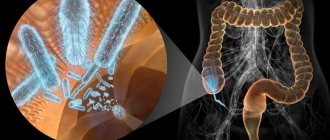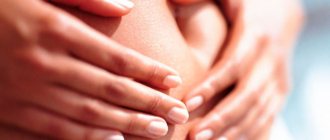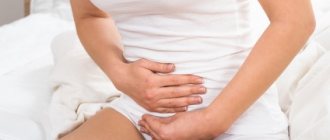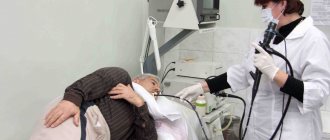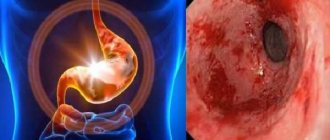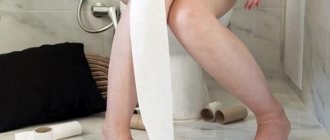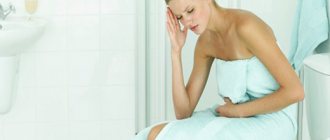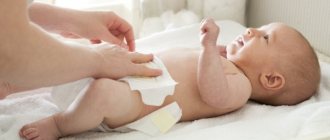Teething symptoms
Which stool does not indicate an infectious disease during teething?
The frequency of bowel movements during this period can reach 3–5 times a day. In this case, the smell and color of feces should not have any specific characteristics. In infants, feces may be yellow or brown and have a normal odor. There should be no impurities in feces. If the disruption of the intestines is caused by a change in the state of the body due to teething, then it lasts no more than 3 days. After the tooth appears, the symptom disappears.
A baby's first teeth are a long-awaited joy for parents. Their appearance is often accompanied by anxiety, fever, and digestive problems in the baby.
These phenomena are short-term in nature and do not affect children's health. However, even a few days of the baby’s illness bring anxiety to the young mother.
It is important for her to know how long diarrhea lasts during teething, and how to help the baby during this difficult period.
Teething is an important moment in a baby’s life, which is often accompanied by diarrhea. What should mom do in this case?
The first baby teeth appear at about 5 months of age. The process is gradual and lasts about two years. The release of each tooth is accompanied by a local decrease in immunity, which increases the risk of pathogenic microorganisms entering the body. This is why the emergence of another baby or molar tooth is so often accompanied by a physiological disorder of the stool.
In order to take the correct treatment measures, it is important for the mother to recognize that diarrhea in a baby is not related to serious infections. Other symptoms of teething will help with this:
- swelling and swelling of the gums;
- excessive salivation;
- the need to chew something hard (teether, toy, bagel);
- anxiety;
- elevated temperature (up to 38 ºС);
- vomit;
- constipation (occurs in bottle-fed babies);
- diarrhea.
Changes in stool, swollen gums and the baby’s desire to chew on everything that comes in its way are sure signs of teething.
READ ALSO: What can you give your child to drink for diarrhea?
- Increased salivation.
It is not by chance that wise nature turns on this mechanism. Saliva washes the mucous membranes of the oral cavity, protecting against the penetration of opportunistic microflora. Once in the child's stomach, it accelerates peristalsis and provokes loose stools. - Weakened immunity.
The risk of an infant catching an intestinal infection during the teething period is quite high. In the summer, rotavirus is common, which is characterized by a slight increase in temperature, vomiting, and watery stools in the first days of the disease. In winter, a weakened child is susceptible to ARVI. - Ingress of microorganisms and bacteria from the outside.
The gums itch, hurt and bother the baby, so he puts everything that is nearby into his mouth. This increases the risk of pathogenic bacteria entering the gastrointestinal tract. - Poor nutrition during teething.
The enzymatic apparatus of the pancreas in a child may malfunction, which provokes intoxication and loose stools. - Heredity, somatic diseases (gastritis, tonsillitis, pancreatitis). If the parents' teething was accompanied by discomfort, then the baby is more likely to experience it in a severe form.
- drugs to slow down intestinal motility (reduce the number of daily bowel movements);
- prebiotics to normalize intestinal microflora;
- absorbents to normalize the intestinal walls;
- immunomodulators and vitamin complexes that increase the child’s body’s resistance to infections;
- drugs to prevent dehydration (normalize acid-base balance).
During teething, diarrhea normally lasts no more than three days READ ALSO: the main stages of teething in infants
Diarrhea without infection lasts up to three days (this is usually how long it takes for a tooth to emerge above the surface of the gum).
The stool is usually yellow-brown, watery, without impurities or foul odor. In this case, the number of bowel movements does not exceed 4 times a day.
If rotavirus or another infection occurs, diarrhea can last 4-6 days, which does not go away without leaving a trace on the baby’s body and requires consultation with a doctor.
READ ALSO: How many months do boys get their first teeth?
Digestive upset in children may be accompanied by fever, frequent regurgitation, swelling, nasal congestion, and runny nose. Sometimes the color and consistency of stool changes, and a stench appears. During this period, it is important to closely monitor the baby to prevent dehydration and deterioration of health.
Diarrhea during teething is not considered a pathology if it does not contain impurities of blood, mucus, or is green in color (a sign of an intestinal infection). Loose stools should not be accompanied by bloating, changes in peristalsis, or pain on palpation.
READ ALSO: how to treat diarrhea with blood and mucus in a child?
The mother can assess the situation on her own by placing her hand on the baby’s tummy, checking its softness, symptoms of gas formation (“gurgling”), and the baby’s reaction to touch. In babies under one year of age, diarrhea should not be profuse and frequent (the norm is up to 4-5 times a day). If it gets worse over time, it indicates a serious problem.
Having determined the severity of the baby’s condition, the doctor decides to prescribe medications. The main goal of therapy is to prevent dehydration, additional infection and taking unnecessary medications.
Antibiotics are prescribed only in case of bacterial infection. Their uncontrolled intake will aggravate the situation, as will an excessive amount of sweets and fruit juices in the baby’s diet.
If diarrhea in children lasts a long time, the following will help get rid of it:
With the permission of a doctor, you can use traditional medicine recipes. Taking decoctions of chamomile and sage soothes the sensitive digestive system and has an antibacterial effect. You can make a mixture of honey and dried ginger root powder and offer it to your child once every 4-5 hours.
Chamomile decoction and other folk remedies can only be used with the permission of a doctor.
The best option for helping children under one year of age is drinking with an oral dehydration solution. However, diarrhea is often associated with other symptoms, which can cause a new mother to sound the alarm. Based on the condition of the baby, treatment tactics are selected:
- if the child looks lethargic and has a fever, you should give him medications based on ibuprofen and paracetamol;
- in the first 3 days you should not get rid of indigestion with drugs that can stop it (Stopdiar and others), the body can cope on its own;
- if there is an accompanying runny nose, you should use vasoconstrictor drops recommended by your doctor (more details in the article: how to treat a runny nose due to teething?);
- if irritation appears on the baby’s skin due to liquid feces, it is necessary to protect the epidermis with panthenol cream;
- if your gums itch, you need to buy a teether;
- You should not give your baby crackers and other hard foods (the baby may choke on an accidentally broken piece);
- it is not always possible to immediately recognize pathology by the type of stool, with the exception of impurities of blood and mucus;
- green stool should alert you, however, it can also be a variant of the norm if foods high in iron were present in the baby’s diet (for more details, see the article: normal and healthy baby stool).
Treatment tactics
For prolonged diarrhea and vomiting, you can use Regidron. It is also important that your baby drinks enough fluids
The first stage of getting rid of diarrhea in a child is to restore the deficiency of water and salts (see also: what to feed a child with diarrhea and other disorders?).
The therapy lasts for 4-6 hours, during which the baby is soldered with a solution of salts and glucose. In case of mild dehydration and no vomiting, the baby initially needs to drink 200-800 ml. liquids. For a child weighing up to 6 kg. 200-400 ml is enough, weighing from 6 kg - 600-800 ml.
The liquid is given in small portions at intervals of 5-15 minutes.
The second stage involves further replacement of fluid loss if indigestion persists. For mild dehydration, the baby needs an additional 50 ml. water per 1 kg.
We suggest you read: Favorable days in August for tooth extraction. Lunar calendar for going to the dentist
The regimen is used until stool normalization.
Prevention
Digestive upset during teething is easy to prevent. This will avoid dehydration, refusal to go for walks, and will keep the baby healthy. During the period when teeth are being cut, pediatricians recommend that parents:
- watch a video on this topic of personal hygiene, keep your hands clean, disinfect things around the child;
- a nursing mother should avoid introducing new foods into her diet;
- use teethers and pain-relieving gels;
- postpone the introduction of new complementary foods;
- do not insist when the baby refuses complementary feeding - it is better to offer him breast or the usual formula.
Simple measures will minimize the risk of digestive upset in a child during teething and will alleviate his condition if diarrhea cannot be avoided. Any dyspeptic disorder is a reason to show the child to the doctor. Only a specialist will determine the correct cause and prescribe therapy that will help you recover without complications.
Changes in stool, swollen gums and the baby’s desire to chew on everything that comes in its way are sure signs of teething.
Why does the baby diarrhea?
Nutrition during teething should be as healthy and gentle as possible. Do not forget that during this period the child’s body is subjected to quite strong stress, and his immunity does not work at full strength. At the same time, some foods may simply not be digested, which will ultimately cause diarrhea.
There are no specifically established signs that appear in all children. One child goes through this period without any problems, while for another, each tooth is given with great pain.
If diarrhea is not associated with an intestinal infection, then specific treatment should not be used. It is only recommended to reduce the load on digestion and reduce the volume of previously introduced complementary foods. If, before teething, the child was completely breastfed, then it must be continued.
Maintaining hygiene becomes even more important during this period, because the baby puts everything in his mouth, and this increases the risk of infection, that is, an intestinal infection.
Toys must be washed with soap, doused with boiling water more often, and baby dishes must be sterilized. The mother of the baby should also wash her hands with soap more often.
If symptoms of an intestinal infection appear, you should not begin self-treatment. Call your pediatrician at home and strictly follow his instructions.
mirzubov.info
Many parents worry whether diarrhea during teething is normal or not? Maybe you should still see a doctor or call an ambulance?
Particular attention should be paid to the number of bowel movements and the condition of the stool. For some babies, one bowel movement per day is considered the norm, for others – 3 or 4. Therefore, more than 4 bowel movements is an alarming signal.
Diarrhea can be a sign of many diseases; if the stool looks different than usual, this should already alert you. Foam, a foul odor, the presence of a large amount of mucus, green or bloody discharge indicate that there is an intestinal infection in the baby’s body, which means immediate medical treatment is necessary.
Frequent stool is also dangerous because it removes fluid from the body, which means there is a risk of dehydration, which is fraught with irreversible consequences and can be fatal.
The danger is that dehydration occurs very quickly, especially in children under one year old. There are signs by which you can determine that your baby’s health is at serious risk:
- Lips become dry and scarlet in color.
- The skin and mucous membranes also look dry.
- The baby becomes lethargic and drowsy.
- The smell of acetone can be detected in the air exhaled by a child.
- Not a lot of saliva, tears and urine.
In this case, the child can only be saved in a hospital setting; the baby is given IV drips; in especially severe cases, a complex of resuscitation measures is needed. As you can see, the risk is very high, so parents need to be very vigilant and immediately respond to deterioration in health.
First of all, the baby needs a warm drink, but this does not mean that he should drink a large amount of liquid at a time. Let him drink a little, but often.
If breastfeeding continues by this time, this is very good, if not, this is not the best time to change formulas, watch the portions, overeating these days is not recommended, it is better to feed the baby more often than usual.
If the baby is bottle-fed, then it is better to cook soups and porridges not with milk, but with water. Diarrhea may be a reaction to new food that the baby received the day before; remember the menu of the last days and exclude suspicious foods.
Don't worry, if your baby has a poor appetite, everything will recover over time, and there is no need to force-feed the baby. You can guess for yourself that your baby’s appetite will return; it is much more important to pay more attention to drinking, because, as we have already said, diarrhea can cause dehydration; every mother should know and remember its signs.
Of course, it’s good if the mother can individually resolve all issues with the pediatrician. Nowadays, the choice of products used for teething is very wide, but the reviews about them are different. You also need to be careful with homeopathic remedies; you need to take into account the individual characteristics of the baby, since their effect on the body can manifest itself in different ways.
You need to try to reduce the baby's pain. Lay him on his back and lightly massage his tummy with warm, clean hands; even simple light stroking will relieve the child of cramps and relieve painful sensations. You can massage the inflamed gums with your finger; of course, before doing this you need to thoroughly wash your hands with soap.
Good results are achieved by using gels that have local analgesic and anti-edematous effects; these days they are available in a wide range. A caring mother will not give the baby carrots, cucumbers or a crust of bread on such days, especially if he already has one tooth, for example, a canine. There is a high risk that the child may choke on the bitten piece.
Children are given special teethers in their hands, massaging their gums with them, the child himself alleviates his condition. There should be several massagers, because when one falls, you will have the opportunity to give the baby another, and in the meantime pick it up and disinfect it.
Treatment of loose stools in an infant
Chamomile decoction and other folk remedies can only be used with the permission of a doctor.
Teething in a child is often accompanied by various symptoms that cause discomfort to the baby and make parents worry. Diarrhea is one of those phenomena that occurs during teething. Most often, loose stools occur when fangs grow.
What is the reason for frequent bowel movements during the eruption of baby teeth? How can you get rid of it? How long does dental diarrhea last and when should you see a doctor?
Experts do not find a clear connection between diarrhea and teething. There are various assumptions about the nature of diarrhea during the period of the first teeth. Possible reasons include:
- Increased secretion of saliva. A large amount of fluid enters the intestines and causes the stool to become liquefied.
- Stress. The child experiences discomfort when teething. He is nervous and sleeps poorly, which affects his general condition, including his digestive system.
- Changes in metabolic processes. During the period of teeth growth, some processes in the body accelerate, so the nature of the stool may change.
- Penetration of a large number of pathogenic microorganisms into the intestines. During this period, the child puts various objects into his mouth. They may contain bacteria that can affect the intestinal microflora. Microorganisms begin to multiply and lead to diarrhea.
Pediatricians also draw the attention of parents to the fact that the time of teething in many children coincides with the introduction of complementary foods. New foods can cause changes in your digestive processes.
We suggest you read: Methylene blue (blue): instructions for use for stomatitis
What to do and how to treat it?
If parents are sure that diarrhea is a sign of teething and not an intestinal infection, then there is nothing particularly to worry about. Usually this problem goes away on its own within a few days. But doctors strongly recommend that you always get tested to exclude the possibility of infection of the child’s body.
Does this symptom need to be treated? The answer to this question cannot be unambiguous. It all depends on the cause of stool liquefaction and its frequency.
First, you should contact your pediatrician and complain about the symptoms that appear. Be sure to pay attention to additional signs.
If your baby is not sleeping well, has a runny nose and a fever, then the doctor must be notified. In most cases, treatment of this manifestation is symptomatic.
First, ask yourself the question: “How long does diarrhea during teething last?” If stool appears more than five times a day, it is worth giving the child a strengthening agent. The drug “Imodium” perfectly inhibits peristalsis. These tablets dissolve quickly in the mouth and begin to work within a few minutes.
Regardless of how many days diarrhea may last, every mother wants to alleviate the child’s condition. This problem does not require any special treatment. Some parents give antibiotics thinking it will help.
But this cannot be done.
In any case, first aid is provided to a child with loose stools. First, the baby needs to be provided with plenty of fluids. Loose stools will undermine the body's water balance, and inattention to the baby's condition will lead to unpleasant consequences.
The first thing parents need to do is to make sure whether the diarrhea is a consequence of teething. There are relative criteria when diarrhea can be considered as a normal reaction of the child’s body to teething:
- The development of diarrhea begins simultaneously with teething, as evidenced by redness and inflammation of the gums, the appearance of tubercles on them, and increased salivation.
- The temperature stays in the range of 37-37.5C, without decreases or surges.
- Loose stools during teething are closer to soft in consistency than watery; yellow in color, free of blood and mucus.
- Diarrhea lasts no more than 3 days, its frequency is no more than 4 times a day.
All of the above points are normal and do not require any serious treatment. First of all, this is not a reason to give your child antibiotics, since they will not only be useless in this situation, but will also contribute to the development of side effects such as dysbiosis, thrush, etc.
However, you can’t do nothing either; you need to at least somehow help the baby alleviate the condition. In this case, symptomatic and preventive treatment of diarrhea is recommended.
There is usually no need for drug treatment for diarrhea. Remember that children should not be given drugs that are popular among adults. So, for example, Loperamide should not be given to children under two years of age. If bloating occurs, you can give your baby Espumisan, or its equivalent.
It is recommended to give Regidron, but not all children like its taste, so the mother will have to be patient. If, after trying it yourself, you feel disgusted, and pity for the child gets the better of you, choose an alternative - it could be freshly brewed chamomile tea or plain boiled water.
All medications must be given according to the instructions, observing the dosage. But we would recommend consulting a pediatrician first, since many of them have side effects.
When is urgent medical attention required?
During teething, many children's immune defenses decrease. Against the background of a weakened immune system, a child can become infected with an infection, which will lead to illness and disturbances in the gastrointestinal tract. In this regard, parents need to constantly monitor the child’s well-being. The following symptoms may indicate the development of the disease:
- diarrhea does not go away for a long time (4–5 days);
- bowel movements occur more than 5 times a day;
- body temperature stays above 38 degrees;
- the child started vomiting;
- loose stools are accompanied by abdominal pain, which is expressed in crying with every bowel movement;
- the feces took on a greenish tint, darkened, became gray or very light;
- feces contain mucus, blood or clots;
- the stool has a strong unpleasant odor.
If the above symptoms appear, you should consult a doctor. However, there are also a number of signs that require urgent medical attention. An ambulance should be called if the following symptoms appear:
- the baby has signs of dehydration and intoxication (the fontanelle has sunk, the baby is lethargic, refuses to eat, the temperature is above 38.5, cries without tears, does not pee for a long time);
- breath smells like acetone;
- the skin has become grayish or blue;
- convulsions appeared.
Prevention
During teething diarrhea after 6 months of life, you need to follow the following tips:
- painkillers are used carefully after a doctor’s prescription and after reading the instructions;
- Antibiotics can only be prescribed by a doctor and it is strictly forbidden to give them to a child on your own;
- maintaining personal hygiene;
- Depending on your age, proper dental care is required;
- You cannot walk with a child who has a high temperature;
- When teeth are cutting through, you should not take your child to crowded places and invite friends to visit.
If you follow the pediatrician's recommendations correctly, the process of changing teeth will become less stressful for the baby. The appearance of an intestinal disorder requires special monitoring of the baby's health. If your stool changes, you should seek help from your pediatrician.
The process of teething is difficult for a baby. At this moment, all the functions of his organs also undergo changes, and viruses lie in wait for the baby everywhere.
Parents should know that diarrhea during primary teething does not last more than a day. Otherwise, there may be loose stools for several days, which is not normal.
Therefore, if a change in consistency and color is observed, urgent assistance from a specialist is required. If a child has previously erupted teeth, but not all of them have appeared, then the parents must provide special food.
Diarrhea during teething in children: what to do?
If loose stools do not tend to become stronger or more frequent and do not cause discomfort to the baby, then, according to experts, it does not need to be treated with medications. During this period, doctors recommend paying special attention to the cleanliness of your baby’s toys, drinking regime, and also adjusting the diet. However, for prolonged and frequent diarrhea, medications must be used.
Experts believe that during the period when teeth are being cut, new foods should not be introduced into the children's diet. If the baby is still fully breastfed, then the mother should avoid eating foods that can worsen diarrhea. The following foods should not be given to a baby or eaten by a nursing mother:
- meat;
- fatty foods;
- smoked sausages;
- milk, fresh kefir and yogurt;
- sour cream and cottage cheese;
- raw fruits and berries;
- prunes;
- fresh juices;
- beets.
The baby should be put to the breast often, and babies who are already receiving complementary foods should be given more to drink. To reduce the intensity of diarrhea, the following products are recommended:
- bananas;
- boiled rice;
- rice water;
- mashed potatoes with water;
- baked apples;
- fruit jelly;
- Black tea;
- dried pear compote;
- drying and crackers.
When you have diarrhea, food should be easy to digest. Until the symptom disappears, the nursing mother or baby should eat light soups and cook porridge in water with a minimum amount of oil. You should also avoid foods that cause increased gas formation (legumes, cucumbers, eggs).
It is necessary to resort to the help of pharmaceuticals when diarrhea lasts more than 3 days or its frequency reaches 5 times a day. Prolonged diarrhea can cause dehydration and intoxication of the body. However, you should not give medications without consulting a doctor.
It is necessary to show the child to the doctor so that he can rule out the presence of a disease or find out the cause of diarrhea. To normalize intestinal function and maintain water balance in the body, pharmaceutical saline solutions, preparations with lactobacilli, and sorbents are prescribed. The table lists medications that are given to babies for diarrhea.
| Drug name | Release form | Compound | Purpose of application |
| Regidron | Soluble powder | Sodium chloride, sodium citrate, potassium chloride, dextrose | Restoring water-salt balance |
| Linex | Capsules with powder inside | Lacto and bifidobacteria, etherococcus fecium, potato starch, lactose | Restoring intestinal flora, reducing the growth of pathogenic microflora, establishing the mechanism of the gastrointestinal tract |
| Hilak forte | Drops | Lactobacilli, bifidobacteria | |
| Espumisan | Solution | Simethicone | Elimination of colic and increased gas formation |
| Pedialight | Powder for preparing solution | Potassium, sodium, chloride, dextrose | Maintaining water and salt levels in the body |
| Humana electrolyte | Potassium and sodium citrates, glucose, sodium chloride | Replenish fluids and electrolytes | |
| Smecta | Dioctahedral smectite | Elimination of diarrhea, removal of dangerous toxins from the body | |
| Enterofuril | Suspension | Nifuroxazide | Fighting infections in the gastrointestinal tract |
The listed drugs can be used to eliminate diarrhea in infants. However, the dosage and frequency of use should be determined by the doctor based on the baby’s physical data and the intensity of the symptom.
Folk remedies
Many parents prefer to use folk remedies when treating babies. However, before using alternative medicine, you should consult with your pediatrician, since some ingredients included in various products can cause allergies or aggravate the child’s condition. The table describes folk recipes and how to use them.
| Name | Main components | Cooking method | Application |
| Lime tea | Dried linden flowers | 2 tbsp. spoons of raw materials pour 200 ml of hot water. Leave for 30 minutes, strain. If desired, you can add a little sugar. | 1 teaspoon 3 times a day. |
| Chamomile infusion | pharmaceutical camomile | 1 tbsp. Pour a spoonful of chamomile into 100 ml of boiling water. Let cool and strain. | Drink 30 ml three times a day. |
| Viburnum decoction | Viburnum berries | 2 tbsp. Boil spoons of berries for 1 minute in 200 ml of water. | Give to the child twice a day as a drink, but not more than 100 ml. |
| Starch drink | Water and potato starch | Dilute 30 grams of starch in half a glass of warm water. | Give the child 1/3 of the resulting solution. If the diarrhea does not go away, you can repeat it. The maximum number of appointments per day is 3. |
| Home Regidron | Salt, sugar, water | 1 tbsp. Pour a spoonful of sugar and 1 teaspoon of salt into a glass of clean water and mix well. | For severe diarrhea, give the child something to drink every 10 minutes. Single dose – 2 teaspoons. |
| Chicory decoction | Chicory inflorescences | Boil Art. spoon of herb in 200 ml of water for 5 minutes. | Give 5 ml of decoction every 3 hours. |
| Blueberry drink | Dry blueberries | Pour 20 grams of berries into 400 ml of boiling water and leave for 8 hours. | Give your baby water 2-3 times a day. |
| Cumin infusion | Dry cumin seeds | Pour 5 grams of raw material into 200 ml of water, brought to a boil. Cool and strain. | Give 15 ml three times a day. |
| Lemon drink | Lemon juice, honey | Add 3-4 drops of lemon juice and 3 grams of honey to 100 ml of water at room temperature. | Offer to baby as a drink. |
Useful information for parents
It’s hard to look at your children if they feel unwell, their stools don’t normalize, they have a high fever, and they’re not vomiting. Wants to do something to relieve the pain. There are useful, proven tips that can help calm your baby a little during the teething period.
- Pharmacies now sell a huge number of products that can soothe pain in the gums. However, their use is not recommended. If you constantly treat a child with antibiotics, his body will get used to it, and in the future these medications simply will not have any effect. It is better to endure this period as long as necessary. Diarrhea and pain will go away on their own, because we all went through this - cutting through our first teeth.
- Massaging your gums may help. It will not get rid of diarrhea, but it will reduce pain symptoms. Pharmacies sell rubber toys that are designed for children to chew on. This toy should be kept in the refrigerator and given to the child several times a day. The cold will soothe swollen gums.
- Now a little about how to treat diarrhea and whether it needs to be done at all. In fact, this is not a disease, and there is nothing wrong with loose stools during teething. However, if the baby is tormented by vomiting for several days, refuses to eat and the diarrhea does not go away, it is worth taking some measures. A small change in diet may help. Try to give your child fruits and vegetables that strengthen them - this will make the stool harder.
- If, after several days, the child’s diarrhea does not go away, it is profuse and frequent, then it is recommended to consult a pediatrician. The doctor will examine the baby and prescribe possible medications and vitamins that will alleviate his condition.
Diarrhea in young children is something that all parents face. It’s just that for one child it can last one day, for another it can last 2-3 days. Be a little patient and give your baby a little more care and attention than usual. Don’t worry, this reaction of the body is strongly manifested only when the first teeth come in, then it will be a little easier.
{SOURCE}
HOW TO HELP YOUR BABY?
A baby who has started teething requires a little more attention than usual.
But what should parents do with children who are capricious, cry and behave restlessly? It is necessary to follow some rules to relieve pain, reduce the temperature and calm the baby:
- Light massage of the gums at the site of inflammation. Before the procedure, you must thoroughly wash your hands with antibacterial soap, rinse it off with plenty of running water and wrap your finger in gauze. You need to massage very gently, without pressing on the eruption site.
- Saliva, constantly flowing when teeth are being cut, irritates the area around the mouth, thereby causing a rash and discomfort. To avoid these troubles, it is necessary to promptly wipe the child’s mouth with a napkin and periodically wash his face with boiled water.
- Give your child a teether purchased at a pharmacy. There are many options, including ones with water inside. The cool liquid will help soothe and relieve inflammation from the gums. Before giving the baby a toy, it must be thoroughly washed and pre-cooled in the refrigerator. After the toy warms up from the baby’s warmth, you need to take the teether, wash it well, and put it back in the refrigerator.
- You can use special painkillers and soothing gels for gums (Kalgel, Dentinox-N).
- At high temperatures, antipyretics should be used: Children's Paracetamol, Nurofen, Cefekon and many others.
- To treat diarrhea, you can use drugs such as Smecta, Regidron. To maintain the balance of microorganisms in the intestines, Linex will help.
- For sleep disturbances and moodiness, you can use warm baths with chamomile and calendula. You can also buy special baby sea salt at the pharmacy. These products help the child relax and calm down, thereby giving the baby and his mother a restful sleep.
Remember, do not self-medicate diarrhea in an infant! If you notice any symptoms at this difficult moment for your baby, consult a specialist for advice. Let it be better to be on the safe side than to miss out on a serious illness.


